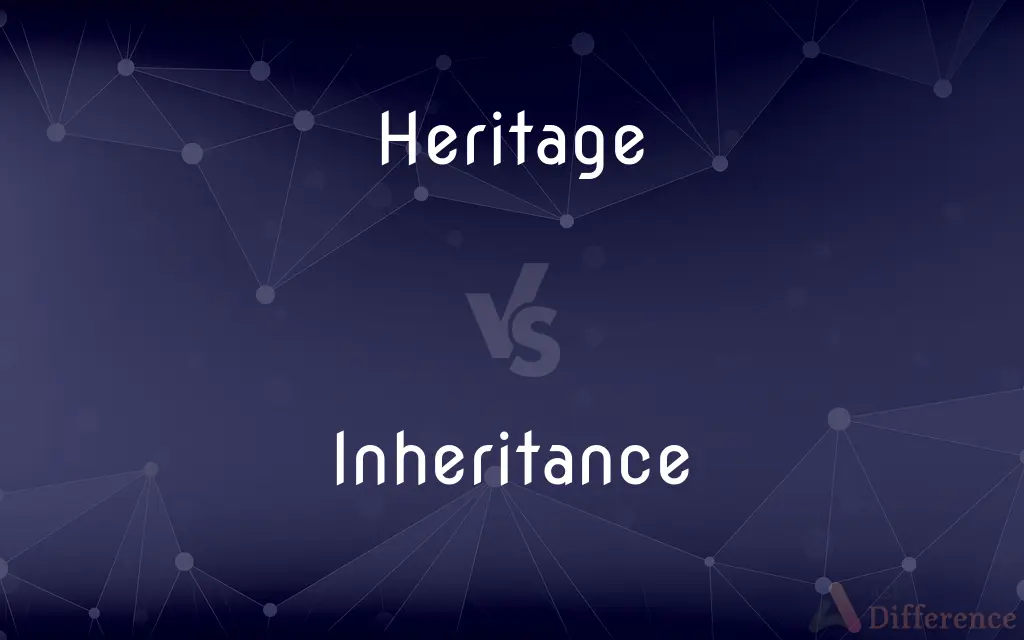Heritage vs. Inheritance — What's the Difference?
By Tayyaba Rehman & Urooj Arif — Updated on March 24, 2024
Heritage reflects cultural or national assets passed through generations, whereas inheritance pertains to personal or legal assets transferred upon someone's death.

Difference Between Heritage and Inheritance
Table of Contents
ADVERTISEMENT
Key Differences
Heritage encompasses the cultural, historical, and traditional aspects passed down through generations, emphasizing collective identity and continuity within a community. It includes tangible elements like monuments and artifacts, and intangible elements like folklore and traditions, which are shared among members of a community or society. On the other hand, inheritance mainly refers to the assets, both tangible and intangible, that are legally transferred from one individual to another after death. This can include money, property, and personal belongings, as well as debts or obligations, and is often governed by legal wills or statutes.
While heritage is a broader concept that connects individuals to their communal past and cultural identity, offering a sense of belonging and historical continuity, inheritance is a personal or familial matter, involving the transfer of ownership of items, properties, or financial assets from the deceased to the living heirs. Heritage is something that one can feel a part of without owning, embodying a shared history or tradition, whereas inheritance is specifically about ownership and the legal transfer of property or assets.
Heritage is preserved and passed down collectively within communities or nations, often with the support of organizations and laws aimed at protecting cultural heritage sites and traditions for future generations. In contrast, inheritance is a personal affair, handled through legal mechanisms like wills and estates, to ensure the deceased's wishes are honored and the rightful heirs receive their due.
Heritage can also influence one's personal identity and values, as it encompasses the practices, values, and knowledge passed down through generations. It shapes individuals' understanding of their place within a larger historical and cultural narrative. Inheritance, while it may include heirlooms or family traditions, primarily deals with the legal and financial aspects of transferring assets.
The preservation of heritage is crucial for maintaining cultural diversity and understanding human history, requiring collective efforts and often state intervention. Inheritance, however, requires legal documentation and processes to ensure the fair distribution of the deceased's estate, focusing on the rights of individuals rather than the collective interest of preserving culture.
ADVERTISEMENT
Comparison Chart
Definition
Cultural, historical, and traditional values and assets passed down through generations.
Assets and obligations legally transferred from one person to another after death.
Nature
Collective and intangible
Personal and often tangible
Purpose
Preserving cultural identity and continuity
Transferring ownership and fulfilling last wishes
Legal Governance
Protected by cultural preservation laws
Governed by wills, estates, and inheritance laws
Impact
Influences communal identity and individual values
Affects personal wealth and property ownership
Compare with Definitions
Heritage
Shared practices, values, and knowledge within a community.
Celebrating Dia de los Muertos is a part of Mexican heritage, honoring ancestors.
Inheritance
Assets received by heirs according to a will or law.
His inheritance included a valuable stamp collection from his father.
Heritage
Heritage sites are landmarks preserved for their cultural significance.
Machu Picchu is a heritage site, reflecting Incan civilization.
Inheritance
Cultural or intellectual qualities acquired from predecessors.
Her talent for music was an inheritance from her family of musicians.
Heritage
Cultural, historical, and traditional elements passed through generations.
The Great Wall of China is part of the Chinese heritage, symbolizing centuries of history.
Inheritance
Receiving responsibilities or duties from predecessors.
Taking over the family business was his inheritance and duty.
Heritage
Traditions and languages passed down to preserve cultural identity.
The Maori haka is a heritage tradition, expressing identity and values.
Inheritance
Genetic traits passed from parents to offspring.
His blue eyes are an inheritance from his mother’s side of the family.
Heritage
Legacy of physical artifacts and intangible attributes of a group.
Native American totem poles are a heritage item, representing tribal lineage.
Inheritance
Legal transfer of property, rights, or obligations after someone's death.
She received her grandmother’s house as an inheritance.
Heritage
Property that is or may be inherited; an inheritance
They had stolen his grandfather's heritage
Inheritance
Inheritance is the practice of passing on private property, titles, debts, entitlements, privileges, rights, and obligations upon the death of an individual. The rules of inheritance differ among societies and have changed over time.
Heritage
A special or individual possession; an allotted portion
God's love remains your heritage
Inheritance
The action of inheriting something
The inheritance of property from a relative.
Heritage
Christians, or the ancient Israelites, seen as God's chosen people.
Inheritance
Something inherited or to be inherited
Her inheritance included a large estate.
Heritage
Property that is or can be inherited; an inheritance.
Inheritance
Something regarded as a heritage
The cultural inheritance of Rome.
Heritage
Something that is passed down from preceding generations; a tradition.
Inheritance
The process of genetic transmission of characteristics from parent or ancestor to offspring.
Heritage
The status acquired by a person through birth; a birthright
A heritage of affluence and social position.
Inheritance
A characteristic so inherited.
Heritage
A domesticated animal or a crop of a traditional breed, usually not widely produced for commercial purposes.
Inheritance
The sum of genetically transmitted characteristics.
Heritage
An inheritance; property that may be inherited.
Inheritance
The passing of title to an estate upon death.
Heritage
A tradition; a practice or set of values that is passed down from preceding generations through families or through institutional memory.
Inheritance
(countable) That which a person is entitled to inherit, by law or testament.
Heritage
A birthright; the status acquired by birth, especially of but not exclusive to the firstborn.
Inheritance
The act or mechanism of inheriting; the state of having inherited
The Indo-European languages share various similarities as a result of their inheritance from a common ancestor.
Heritage
(attributive) Having a certain background, such as growing up with a second language.
A heritage speaker; a heritage language
The university requires heritage Spanish students to enroll in a specially designed Spanish program not available to non-heritage students.
Inheritance
The biological attributes passed hereditarily from ancestors to their offspring.
Heritage
That which is inherited, or passes from heir to heir; inheritance.
Part of my heritage,Which my dead father did bequeath to me.
Inheritance
The mechanism whereby parts of a superclass are available to instances of its subclass.
Heritage
A possession; the Israelites, as God's chosen people; also, a flock under pastoral charge.
Inheritance
The act or state of inheriting; as, the inheritance of an estate; the inheritance of mental or physical qualities.
Heritage
Practices that are handed down from the past by tradition;
A heritage of freedom
Inheritance
That which is or may be inherited; that which is derived by an heir from an ancestor or other person; a heritage; a possession which passes by descent.
When the man dies, let the inheritanceDescend unto the daughter.
Heritage
Any attribute or immaterial possession that is inherited from ancestors;
My only inheritance was my mother's blessing
The world's heritage of knowledge
Inheritance
A permanent or valuable possession or blessing, esp. one received by gift or without purchase; a benefaction.
To an inheritance incorruptible, and undefiled, and that fadeth not away.
Heritage
That which is inherited; a title or property or estate that passes by law to the heir on the death of the owner
Inheritance
Possession; ownership; acquisition.
To you th' inheritance belongs by rightOf brother's praise; to you eke 'longs his love.
Heritage
Hereditary succession to a title or an office or property
Inheritance
Transmission and reception by animal or plant generation.
Inheritance
A perpetual or continuing right which a man and his heirs have to an estate; an estate which a man has by descent as heir to another, or which he may transmit to another as his heir; an estate derived from an ancestor to an heir in course of law.
Men are not proprietors of what they have, merely for themselves; their children have a title to part of it which comes to be wholly theirs when death has put an end to their parents' use of it; and this we call inheritance.
Inheritance
Hereditary succession to a title or an office or property
Inheritance
That which is inherited; a title or property or estate that passes by law to the heir on the death of the owner
Inheritance
(genetics) attributes acquired via biological heredity from the parents
Inheritance
Any attribute or immaterial possession that is inherited from ancestors;
My only inheritance was my mother's blessing
The world's heritage of knowledge
Common Curiosities
Is inheritance always material?
While inheritance often involves material assets like money or property, it can also include genetic traits or cultural qualities.
What is inheritance?
Inheritance involves the legal transfer of assets, rights, or obligations from the deceased to their heirs.
What is heritage?
Heritage refers to the cultural, historical, and traditional elements passed through generations, shaping community identity.
How do heritage and inheritance differ in nature?
Heritage is collective and often intangible, emphasizing cultural identity, whereas inheritance is personal, often tangible, and involves legal transfer of ownership.
Can heritage include physical assets?
Yes, heritage can include physical assets like historical buildings or artifacts, but it primarily focuses on intangible cultural values.
How is heritage preserved?
Heritage is preserved through collective efforts, including cultural preservation laws and activities aimed at maintaining traditions and sites.
Who governs inheritance?
Inheritance is governed by legal mechanisms such as wills, estates, and inheritance laws, ensuring the deceased's wishes are honored.
Can one refuse an inheritance?
Yes, heirs can refuse an inheritance, a process known as disclaiming, which must follow legal procedures.
What happens if there is no will?
If there is no will, inheritance is distributed according to state or country-specific intestacy laws.
Why is preserving heritage important?
Preserving heritage is important for maintaining cultural diversity, educating future generations, and fostering a sense of belonging and identity.
How does heritage impact individual identity?
Heritage influences personal identity and values by connecting individuals to their cultural roots and community history.
What role do wills play in inheritance?
Wills specify the distribution of an individual's assets after death, guiding the inheritance process.
Can inheritance include debt?
Yes, inheritance can include the deceased's debts, which may need to be settled from the estate before distribution.
What is a heritage site?
A heritage site is a landmark recognized for its cultural, historical, or scientific significance, often protected by law.
Can heritage change over time?
While heritage is rooted in history, it can evolve as communities adopt new practices or reinterpret traditions.
Share Your Discovery

Previous Comparison
Caiman vs. Cayman
Next Comparison
Weasel vs. MeerkatAuthor Spotlight
Written by
Tayyaba RehmanTayyaba Rehman is a distinguished writer, currently serving as a primary contributor to askdifference.com. As a researcher in semantics and etymology, Tayyaba's passion for the complexity of languages and their distinctions has found a perfect home on the platform. Tayyaba delves into the intricacies of language, distinguishing between commonly confused words and phrases, thereby providing clarity for readers worldwide.
Co-written by
Urooj ArifUrooj is a skilled content writer at Ask Difference, known for her exceptional ability to simplify complex topics into engaging and informative content. With a passion for research and a flair for clear, concise writing, she consistently delivers articles that resonate with our diverse audience.
















































